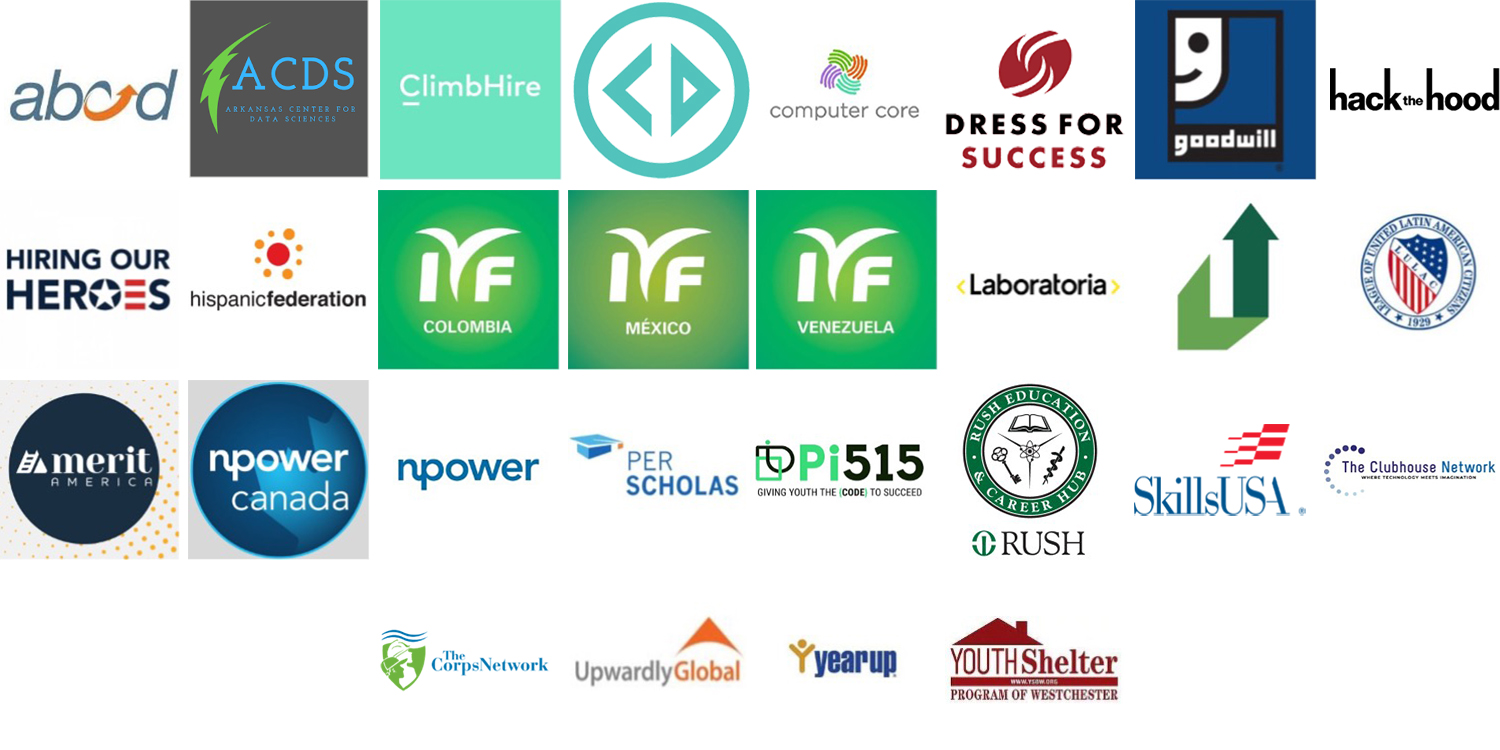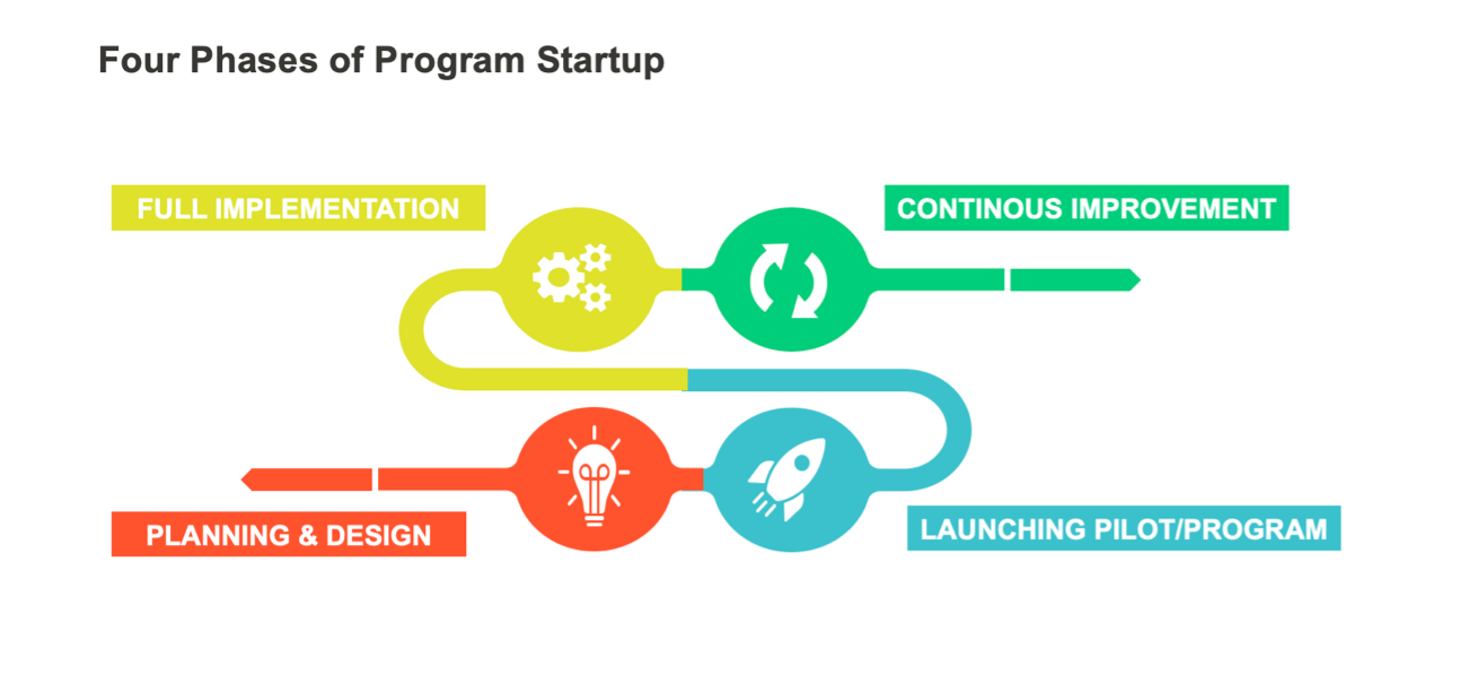

Expanding On-Ramps to Tech Careers Through College, Nonprofit, and Public Sector Partnerships
April 18, 2018
At a Glance
JFF joins with Google to train adults for high-growth, high-demand careers that pay family-sustaining wages in today’s digital economy.
Google.org is supporting JFF to integrate the Google Career Certificates into leading community colleges across the country, with a focus on 12 priority states: California, Colorado, Georgia, Iowa, Michigan, North Carolina, New York, Ohio, Oklahoma, Oregon, Pennsylvania, and Texas. These schools will incorporate the certificates directly into their existing curriculum or offer credit for learners who have already completed one or more of the certificates. This effort builds upon JFF’s prior work recruiting community colleges in the Appalachian region and 20 states to offer Google’s initial Career Certificate, the IT Support Professional Certificate.
The community college’s scope of work is expanding dramatically and, although we still take great pride in our ability to create content, we are increasingly aware of the opportunities afforded by leaning on quality, verified content developed by others. As an equity-minded institution, Mohawk Valley Community College is thrilled to harness Google Career Certificates’ content because doing so provides latitude for the College to target our efforts on implementing essential student supports tailored specifically to the needs of disparate student populations as a vehicle to realize our goal of achieving equitable student outcomes.
Randall J. VanWagoner, Ph.D., President, Mohawk Valley Community College
What Are the Google Career Certificates?
The Google Career Certificates are a first-of-their-kind program with highly interactive content, exclusively developed by Google. These certificates help learners gain readiness for an entry-level job in the high-demand, high-growth fields of IT, data analytics, digital marketing and e-commerce, project management, and user experience (UX) design in about eight months. No prior experience is necessary. Once a program is completed, certificate holders can opt in to share their information directly with the hiring consortium of top employers looking to hire entry-level employees, including Ford, Macy’s, Crate & Barrel, Walmart, DataDog, Verizon, Salesforce, Workday, Deloitte, Bayer, Advance Auto Parts, Target, Snap Inc., Infosys, Huge Inc., Accenture, SAP, GroupM, Dow, and, of course, Google. Many of these companies are very interested in working with community colleges to build the talent pipeline into their current and future jobs.
To support industry recognition of the Google Career Certificates, JFF is working with Google to engage national, regional, and local employers as a part of the Google Hiring Consortium. Community colleges that participate in the Google Career Certificate Community College Expansion Project in 2022-2023 receive support in building strategic partnerships with employers seeking to hire certificate earners in their region.
Community College Providers
Grow with Google is supporting JFF to integrate the Google Career Certificates into leading community colleges across the country to expand access to high-growth careers for learners who identify as Black, Latinx, female, and other populations currently underrepresented in the tech sector. These efforts focus on 12 priority states: California, Colorado, Georgia, Iowa, Michigan, North Carolina, New York, Ohio, Oklahoma, Oregon, Pennsylvania, and Texas. These institutions will incorporate the certificates directly into their existing credit and/or non-credit curriculum. In addition, institutions may elect to offer credit to learners who have already completed one or more certificates through credit for prior learning (prior learning assessment), as most of the Google Career Certificates have been assessed for American Council on Education (ACE) equivalencies. This effort builds upon JFF’s prior work recruiting community colleges in the Appalachian region and 20 states to offer Google’s initial Career Certificate, the IT Support Professional Certificate.
The map below lists the colleges that JFF has worked with to integrate both the original IT Support Professional certificate and the growing suite of certificates into their for-credit and non-credit programs.
Please submit an inquiry for additional information or if you would like to connect with the main point of contact at a participating institution.
Community Based Organization Providers
With support from Google.org, JFF has partnered with national and local nonprofit and community-based workforce organizations to support learners who identify as Black, Latinx, women, and other populations currently underrepresented in the tech sector. Learners gain access to the Google Career Certificates curriculum to help them prepare for a career in the tech industry. In collaboration with JFF, provider organizations have developed and implemented programming to support learners in completing the certificates and assist them with job placement post-completion. Organizations that are part of this initiative benefit from peer learning through a virtual community of practice, support from JFF’s technical assistance team, and free learning events on program design, implementation, and employer engagement. See below for the organizations that JFF is currently supporting.

Please submit an inquiry for additional information or if you would like to connect with the main point of contact at a participating organization.
Public Sector Providers
The onset of the pandemic left the public sector burdened by employment gaps for vital tech workers, struggling to hire and retain those capable of overseeing important government systems and technology updates required for (now) online essential services. JFF, with funding from Google and IBM, launched the Public Sector Digital Jobs Innovation Project to address this gap.
Grant awardees and JFF work together and leverage opportunities to develop an inclusive and comprehensive digital jobs strategy—one which specifically supports on-ramps to high-quality technology careers for underrepresented individuals in this sector. This includes women of all racial backgrounds, Black, Indigenous, and Latinx workers, and those from other racial backgrounds.
Community Resources
The materials below were developed to support organizations in implementing the Google Career Certificates by highlighting best practices, important considerations, and resources to support facilitators and instructors. Organizations and community colleges that would like to offer one or more certificates can take advantage of these materials. Email JFF to participate in this free learning community, attend select webinars, and receive resources created just for certificate providers.
This page will be continually updated as new resources become available.
Get Started with the Google Career Certificates Using Our Quick Start Guide
The Quick Start Guide is a resource for groups such as nonprofit organizations or community colleges that want to offer one or more of the Google Career Certificates. It provides an overview of the certificate program and the roles and responsibilities of organizations that offer it. This includes a toolkit of effective strategies for recruiting, instructing, and supporting learners, as well as an appendix that provides at-a-glance profiles of each certificate.
OFFERING THE CERTIFICATES
Organizations that offer the Google Career Certificates have flexibility in how they implement the program and present the coursework, but the most successful organizations begin with a detailed plan for three core activities: participant recruitment, instruction, and participant support.
Getting Started
Before launching the Google Career Certificates, provider organizations should develop an implementation plan that outlines their intended approach to certificate delivery and learner support. The development of this document is an opportunity to brainstorm, plan, and design the organization’s strategy as it relates to participant recruitment, instructional model, and learner support.
When planning, organizations should consider the startup process in four parts. After initial planning and program design, operate a smaller-scale pilot with an initial group of learners to better understand the learner experience and identify programmatic changes before launching into full implementation. Once underway, identify opportunities for continuous improvement of the design for future cohorts of learners.

Related Content


Kathy Mannes in "Preparing the Next Generation of Tech Talent"
February 24, 2020
Meet the Learners of the Google IT Support Professional Certificate
JFF research identified five types of individuals who have successfully completed the Google IT Support Professional Certificate. Learn more about these personas and how to select and support participants to best position them for long-term…

Paving the Way: Creating Tech Career Pathways in the Public Sector
September 21, 2022
Public Sector Digital Jobs Innovation Project
Our Partners After a competitive application process, JFF is pleased to announce the following grant awardees: “The Hampton Roads Workforce Council is delving into talent development for digital jobs with support from JFF’s Public Sector…

Building Tech Talent for the Public Sector
As the necessity and demand for technology to provide essential services to citizens across federal, state, and local agencies grows, an IT career in the public sector has never looked better. Stay Tuned! JFF is…

Getting Started With Google Career Certificates: Key Questions and Considerations for Nonprofit Providers
Out of Jobs for the Future’s (JFF) collaboration with Google to scale its Career Certification to nonprofits and community colleges, insights from these organizations to effectively implement those training have emerged and are outlined in…